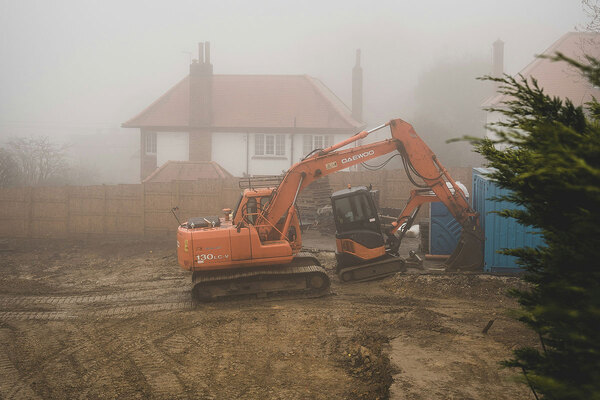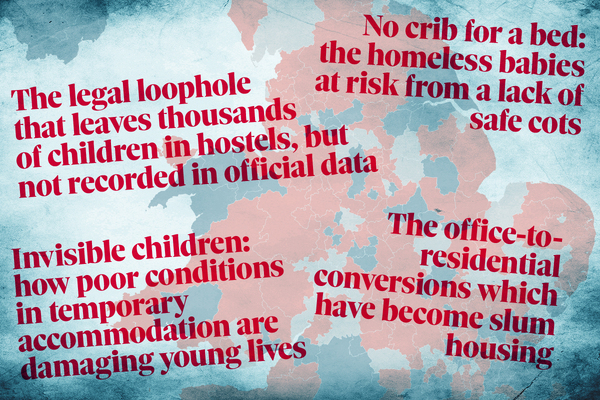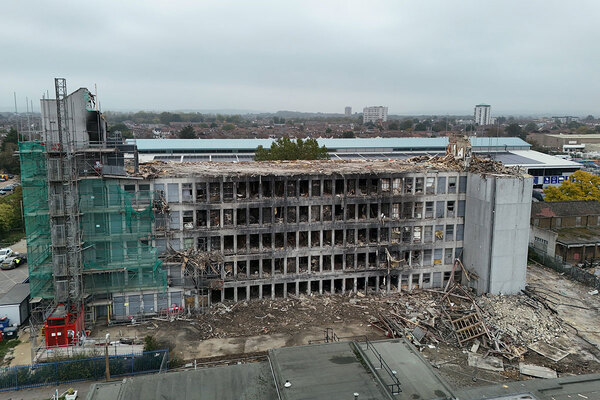You are viewing 1 of your 1 free articles
Ombudsman finds some ‘not ready for Awaab’s Law’ as it highlights 27 landlords over leaks failures
The Housing Ombudsman has said some are “not ready for Awaab’s Law” as it highlighted 27 social landlords in its latest severe maladministration report, which looks at handling leaks.
The watchdog said lessons should be learned from the cases, some of which led to ceilings collapsing, belongings being destroyed and residents being forced out of their homes for long periods of time.
The ombudsman said leaks are a “significant” driver of complaints.
“To avoid the level of distress and impact experienced by the families in this report, the sector needs to be more consistent and robust in response,” said housing ombudsman Richard Blakeway in his introduction to the report.
The report is part of a series providing lessons to help the sector prepare for the introduction of Awaab’s Law, which will require landlords to respond to repairs, including damp and mould, within specific timescales.
In May, Inside Housing’s Tenant and Resident Engagement Conference heard similar concerns as the ombudsman raised from residents, who said the sector is “absolutely” not ready for the new law.
Mr Blakeway said the themes in the leaks severe maladministration report are “clear and range from poor diagnosis, excessive delays, and a failure to consider individual circumstances, especially where vulnerabilities are present”.
The ombudsman highlighted two landlords “that speak to the key themes relating to leaks”: L&Q and Lambeth Council.
The ombudsman made nine findings of severe maladministration in how L&Q has handled leaks, with issues ranging from residents who had water pouring down their walls, to others being forced to move out for over two years due to widespread problems.
The findings relate to cases, which are being published for the first time, either determined after the special report on L&Q by the ombudsman last year or with issues ongoing at the same time as it. Last year, the watchdog ordered L&Q to pay out £142,000 in compensation after a special investigation uncovered a “prolonged period of decline” in its repairs and complaint-handling.
In the newly published cases, the ombudsman found evidence of “severe delays” from the housing association. In one case, L&Q failed to attend to repair a leak until 10 months after it was reported.
The resident reported that due to the delays, water was spreading into other rooms and flats. Their daughter was sleeping next to a damp wall and the damp caused by the leak meant they had to have their heating on continuously.
“The landlord also refused to give some updates to the resident on the leak due to GDPR,” the report said. L&Q used the same GDPR (General Data Protection Regulation) reasoning in another case for not providing information to the resident.
“The landlord used various excuses for the works not being completed, but ultimately it took 100 weeks for it to deal with the issue,” the report stated.
In another case, a shared owner had to wait 21 months for a repair to take place, only for the problem to reoccur. “The resident was often forced to mitigate the leaks with buckets, leaving her unable to go away for periods of time and unable to use her living room as intended. On top of this, the resident’s ceiling collapsed due to the leak,” the ombudsman found.
The resident was also unable to replace damaged furnishings, light fittings or decorations because the leak remained ongoing.
In another case, L&Q failed to fix a leak for nearly four years.
The ombudsman ordered the landlord to apologise to every resident involved in the cases, as well as give out £35,397 in compensation, and to undertake reviews into several policies including preventing co-ordination of repairs involving latent defects failings, record-keeping and rehousing.
L&Q apologised in a statement (included in full below) and said the nine determinations preceded the improvement plans it already has in place.
Lambeth Council was the subject of a special investigation in 2022 and an inspection in 2023, the latter of which found that too many residents are “still receiving an unacceptable service”.
The cases highlighted in the ombudsman’s new report included five findings of severe maladministration in how Lambeth dealt with a series of cases involving leaks.
In two of the cases, residents’ ceilings collapsed. In one of those, the council took 395 working days to repair the leak that led to the collapse. Another resident’s ceiling fell through after the landlord took 23 months to complete repairs.
In another case, although the ceiling did not cave in, the resident’s “walls were crumbling and she was worried the ceiling was the next thing to collapse”.
“This caused her significant distress and inconvenience, and ended up with her kitchen becoming damp and unusable, with an infestation of silverfish as a result,” according to the report.
In all of the cases, the ombudsman ordered the council to apologise to the residents, pay £8,545 in compensation and review various policies such as communicating with residents, contractor management policies and training needs.
In a statement (included in full below), Lambeth Council said it accepted the findings and outlined the approach it is taking to tackle repairs.
In learning from the cases related to both landlords, the ombudsman acknowledged that “leaks can be complex to resolve”, but said that when a resident first reports a leak, the landlord “should be inspecting that as a matter of urgency”.
It said: “Once this inspection is carried out, works to resolve a leak or find the source should also be undertaken quickly to avoid any further damage or inconvenience.
“During this time, landlords should be communicating well and keeping effective records of the works that have taken place, and what is to come. Improving communication is a strong theme across complaints and an integral part to Awaab’s Law.
“Any follow-up works should be organised in a reasonable timeframe and follow-up inspections following the completion of the works should be undertaken, to make sure that the fix has resolved the problem for the household.”
In total, the ombudsman’s report highlighted 27 landlords following severe maladministration findings related to leaks:
- Arhag Housing Association
- Birmingham City Council
- Clarion
- Ealing Council
- Gentoo Group
- Hackney Council
- Haringey Council
- Homes Plus
- Irwell Valley Homes
- Islington Council
- Lambeth Council
- L&Q
- Metropolitan Thames Valley
- Milton Keynes City Council
- Newham Council
- One Housing
- PA Housing
- Peabody
- Platform Housing Group
- Redbridge Council
- Royal Borough of Kensington and Chelsea
- Sanctuary
- Shepherds Bush Housing Group
- Southern Housing
- Tower Hamlets Council
- Wandle
- Welwyn Hatfield Borough Council
The main learning for the sector from the cases includes responding to leak reports and identifying their root cause quickly, communicating well with residents about the progress and timescale of repairs, and having robust record-keeping.
Mr Blakeway said: “Leaks can be complex and challenging. These cases show how leaks can also cause acute distress and disruption to families and the sector needs to be more consistent and robust in response.
“There are common strands of learning from these cases and various moments when the landlord could have taken decisive action to make things right for the resident and restore trust in its ability to resolve these issues.
“Too often the basics are not being done right in these cases and that compounds what is already a complex area to deal with. Landlords must identify these key touchpoints during the lifetime of these cases, and act appropriately to mitigate the impact on families and households.
“These cases also reveal in stark terms that some landlords are not ready for Awaab’s Law and how widely variable landlord policy and practice can be, which is neither desirable nor sustainable.”
If you are a landlord mentioned in this report and would like to comment, please contact grainne.cuffe@oceanmedia.co.uk.
Landlords’ statements
L&Q
“We’re sorry that we got things wrong for these residents.
“Repairs are a priority at L&Q as we understand how frustrating these can be and the impact they can have on residents.
“These nine determinations precede the improvement plans we already had in place and have been working on together with the ombudsman since their Paragraph 49 report was published.
“As a result of these plans, we have already made major progress to ensure we tackle operational challenges, including repairs, and that we deliver quality services every time. In addition to this, our 15-year major works investment programme will see us invest £3bn to improve residents’ homes and includes repairs and upgrades to kitchens, bathrooms, windows and roofs that will address many of the issues that lead to leaks.
“We have also introduced a new strategy that improves our ability to diagnose and resolve leaks more quickly.”
Lambeth Council
“Lambeth has over 33,000 council homes and ensuring these are safe and well-maintained for all our residents is our top priority.
“However, it is clear that our service fell below our normal high standards in these cases.
“Lambeth has, of course, accepted the ombudsman’s findings in these cases, which were initiated in 2022 and 2023; and we have complied with the orders set out in the determination of each case.
“We have apologised to each tenant for the distress and inconvenience they experienced, and resolved the problems they reported at their homes, as well as paying them compensation.
“We have also carried out reviews of our management of individual cases and of our procedures, in response to individual findings.
“In addition to resolving these individual cases, however, we will ensure that we take lessons from them to further improve our service to all tenants in the future – particularly in relation to tackling leaks.
“Lambeth is committed to tackling all problems quickly and fairly, and we have worked intensively with the Housing Ombudsman Service and with residents to improve the way we respond to complaints.
“Despite continuing reductions in [previous] government funding, Lambeth has invested hundreds of millions of pounds in improving our council homes and estates in recent years. We have also awarded 10 repair and maintenance contracts to new providers as part of our drive to improve standards and services for council tenants.
“Tackling leaks, damp and mould is a key priority for the council, as we know these can be highly disruptive for our residents and have the potential to escalate.
“We have also implemented a number of improvements aimed at all staff responsible for handling complaints, which include dedicated complaints officers with wide experience across housing services; extra training for complaint-handlers, to improve the quality and timeliness of responses; increased monitoring of remedies; and retrospective case reviews.
“These wide-ranging changes will bring the lasting improvements required, and it is clear they are already having an impact.
“Through continuing to work closely with the Housing Ombudsman Service, and listening to our residents, we believe the service we offer to everyone will continue to improve. The improvements we have achieved so far were recognised by the ombudsman in his recent inspection.”
Hackney Council
“Like most issues investigated by the ombudsman the case mentioned in the report is a very complex case. “However, we fully recognise that the lengthy delay in being able to fully resolve these issues has caused frustration and distress for our resident for which we apologise.
“We remain committed to finding a solution to the issues our resident has been facing, as well as undertaking the necessary maintenance work to the block as a whole. Work is ongoing to achieve this and we will be carrying out a condition survey of the block between July and September this year which will have the issue of leaks as a key focus.
“The information we provided to our resident throughout should have been better. We accept that we should have ensured he was given regular updates and we should have been clearer about the process of providing a temporary home while repair work took place.
“We are working hard to continually improve our communications with residents and the ombudsman’s findings in this case highlight the importance of getting this right.
“It is always disappointing when residents feel they have to report an issue to the ombudsman. We take all complaints and Housing Ombudsman findings very seriously and use them to help us further build on the improvements we are already embedding across our service.”
Islington Council
“We're very sorry for the distress caused in this case. We have apologised to the resident and completed all outstanding works.
“We’ve made significant improvements in our approach to leaks, damp, and mould in the last 18 months. This includes setting up a dedicated leaks team to tackle complex cases, introducing new processes so jobs involving leaks are monitored closely, and increasing preventative investment.
“We’ve learned lessons from this case and are taking steps to raise standards across our repairs service, including:
Improving communication, for example through additional customer service training.
Implementing new processes on missed appointments and cancellations.
Learning from complaints, for example in monthly review meetings where we discuss trends and develop collaborative action plans across teams.
Completing a comprehensive audit of the ombudsman’s spotlight report on Knowledge and Information Management and self-assessing against its recommendations.
“Over the next 12 months we will be setting up a resident repairs panel to review complaints and help shape service improvements. We will also be reviewing our policies every two years and continually improving our processes based on resident feedback.
“We’ve strengthened our approach to reasonable adjustments to make sure they’re recorded when residents first report a repair and acted on.
“ We’re also transforming our complaints service and have created a dedicated housing complaints team, invested in additional staff and training, and are improving processes for quicker decision making.
“We will continue to learn from mistakes to drive improvements, so residents get the high-quality service they deserve.”
Sign up for our asset management newsletter
Already have an account? Click here to manage your newsletters












